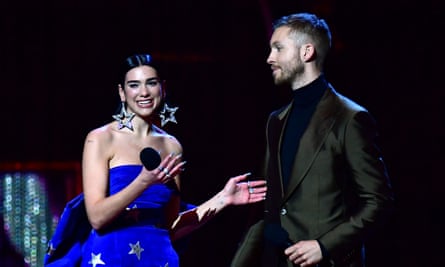The Brits moment most likely to dominate today’s tabloid coverage was Beyoncé and Jay-Z’s acceptance speech for best international group as the Carters. The fact that the high-powered couple sent a video message would have been news enough (they entirely ignored the recent Grammy awards). That they accepted the award standing before a portrait of Meghan Markle in traditional royal dress, mirroring the videos they made in the Louvre for their collaborative Everything Is Love album, was even more remarkable.
They made no reference to Markle or the painting in their brief speech, but it’s no stretch to interpret the display as a show of support for the Duchess of Sussex, who has faced increasingly hostile coverage from the tabloids, particularly in the later stages of her pregnancy.
For the music industry, remarks made by the 1975 – the Manchester band named best British group and keepers of the best British album – would make the biggest impact. It was bracing to hear frontman Matty Healy pull a piece of paper from his pocket and read a quote about how “male misogynist acts are examined for nuance and examined as traits of difficult artists while women and those who call them out are treated as hysterics who don’t understand art”, not least because, well, I wrote those words in an article about being degraded by a male musician in 2015, and quoted them in a piece about the allegations made against Ryan Adams last week.
Setting aside the fact that hearing a pop star mention your name during an awards ceremony is fairly discombobulating, hearing a leading male rock artist decry the systems that have historically buoyed their career while pointing out the double standards that women face – in front of the music industry that sustains those dynamics – felt remarkable.
These iconoclastic displays put the night’s other putatively political action in stark contrast: Jess Glynne’s earnest performance of her song Thursday – in which she along with 70 influencers and models removed their makeup on stage – felt try-hard. The presence of a branded microfibre makeup removal cloth, easily identifiable to many women, made the display about a woman’s worth not being tied to her appearance appear inextricable from the market forces that sell women the messages that sustain a culture of insecurity. (I give it a few hours before a press release for the cloth appears in my inbox.)


These were the banner moments in a ceremony largely devoid of drama, bar host Jack Whitehall’s admirable attempts to goad the assembled stars into outraged reactions and spilled gossip. There had been little furore leading up to this year’s Brit awards, which – like the Grammys – seems to dwindle in relevance every year despite overdue attempts at progress. A 2018 report suggested that the UK was losing its knack for producing global pop superstars: tellingly, last night Ed Sheeran won the global success award (for sheer commercial might) for a second year running, unrivalled by insurgents.
Last night’s superstar winners in the three international categories – Ariana Grande as best female, the Carters best group, Drake best male – showed up the insularity of the Brits and much of British pop. Bombastic balladeer Tom Walker (British breakthrough) and endearing troubadour George Ezra (British male) hew to established templates that don’t translate internationally.
That said, it seemed odd that it had taken Calvin Harris, a British pop superstar, so long to win his first Brits. After 14 unsuccessful nominations, his double win felt long overdue given the Brits’ propensity for rewarding commercial success. Last night he took home best producer, and British single for One Kiss with Dua Lipa – deserving victories, but ones that posed questions about women’s roles in contemporary pop.

Unlike last year, when artists wore white rose pins in support of the Time’s Up movement and Stormzy triumphed over Ed Sheeran in major categories, the 2019 Brits made no clear correctives regarding diversity. BAME artists remained underrepresented, receiving fewer than half as many nominations and wins as white artists. The gender divide was less stark, but there are now questions to grapple with beyond the basic fact of representation – namely the extent to which women get to author their own work.
A BBC report published this week showed the decline of hit songs credited solely to female artists. Harris and Lipa encouragingly shared top billing and songwriting credit on their winning single One Kiss (though she thanked him for letting her appear), but many of the night’s nominated songs found female artists billed as featured artists to male producers – as well as primarily male production and songwriting teams.
“As women, we get moulded in to something that we don’t necessarily want to be,” singer Mabel told the BBC. And in the on-off 27-year history of the best producer prize, Kate Bush and Alison Goldfrapp are the only female nominees in an area where women remain dramatically underrepresented, illustrating the paucity of opportunity for women attempting to break in and of recognition for those who have done so. (Obviously, no woman has ever won this category.) Letting female talent flourish – and setting aside the “genius male producer” archetype – could be the first step to British pop breaking borders again.
